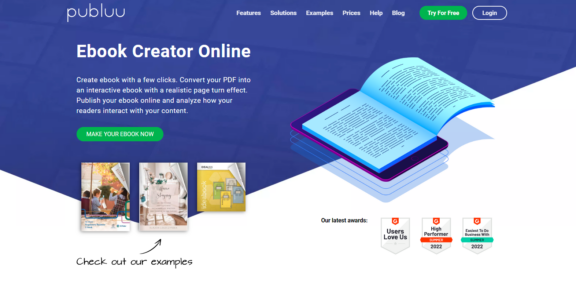Book Marketing – Strategies for Boosting Your Sales
Searching for ways to boost your book’s market presence? With so many books out there, smart marketing is what helps yours get noticed. In this article, you’ll find practical, use-it-today ideas - from building an author brand people remember, to making online stores work in your favor, to publishing a digital version that’s easy to share and discover.
Ready to evolve your book marketing approach? Let’s navigate the blueprint to give your book the attention it deserves.
Key Takeaways
-
Build a strong author brand with the basics done well: a clear website and bio, a couple of social channels your readers actually use, and a consistent look and tone across everything you publish.
-
Put together a simple marketing plan: know exactly who you’re writing for, set goals you can measure, and plan a launch that gives the book a boost - then keep showing up so sales don’t drop off a week later.
-
Use reviews and publicity to build trust and visibility - get early reviews lined up, send a press release that doesn’t sound generic, and show up where readers are (book clubs, events, conferences) to grow your community and sales.
Crafting Your Author Brand

A strong author brand is what makes people remember you - and what helps readers (and sometimes publishers) quickly "get" what you write. It’s not just your logo or headshot; it’s the overall vibe you give off: your voice, your themes, and the kind of stories readers can expect from you.
If you write sci-fi, this is where you start: figure out how to present your work in a way that feels consistent, memorable, and unmistakably yours.
Building an Engaging Author Website
Think of your author website as your home base online. It’s where readers can learn who you are, explore your books, and keep up with what you’re doing - not just a "nice to have" page, but a place that can turn a curious visitor into a real fan.
A great author website usually includes:
-
A clear "About" page
-
Professional-looking book covers
-
Short blurbs for each book
-
Direct links to buy
-
A contact form
-
An email newsletter signup
When your website and social profiles look and sound consistent, people remember you faster - and it feels more trustworthy. And remember, adding a specific page for an upcoming book can ignite readers’ curiosity and keep them updated about the release. Also, don’t forget to incorporate social sharing options on your book sales pages. It also makes it simple for readers to share your book with friends, which can bring in extra attention without you having to push so hard.
Leveraging Social Media Platforms
Social media can absolutely help - it’s a great way to meet readers, build a following, and talk about your books. The trick is not to be everywhere, but to show up consistently where your readers already are. Spreading your efforts too thin by maintaining a presence on too many platforms at once can dilute your impact.
Pick one or two platforms and use them well - reply to people, join conversations, and build real connections instead of just posting and disappearing.
Crafting a Compelling Author Bio
Your author bio is a snapshot of who you are as a writer. It’s your chance to introduce yourself, share a bit of your background, and give readers a reason to trust you. A bio with a hint of personality also makes it easier for people to feel connected to the person behind the book.
Whether it’s on your website or a retailer page, a good bio helps readers understand what you write - and why they might enjoy it.
Online Book Marketing
These days, turning your book into a format that’s easy to browse online, and more interactive than a plain file, can make it more shareable and more appealing to readers. A standout tool for achieving this is the Publuu - Flipbook Maker. Publuu lets you turn a static PDF into a digital book with a realistic page-flip feel and interactive extras. You can also match it to your branding - add your logo and pick backgrounds so the whole thing looks like "you".

It also gives you stats on how people use your book, what they click, how long they stay, and where they drop off, so you can make smarter marketing decisions later.
If you want something that’s straightforward to set up but still looks polished, Publuu can be a handy tool - especially when you’re trying to stand out among a lot of similar titles.
Developing a Strategic Marketing Plan

A marketing plan keeps you focused. It helps you decide what to do, when to do it, and who you’re trying to reach - instead of posting at random and hoping for the best. When you line it up with your publishing schedule, it’s much easier to time promos, content, and launch activities well.
There isn’t one "perfect" plan - what works depends on your genre and the readers you’re trying to reach, so it’s worth thinking it through before you jump in. Let’s proceed to understand this better.
Identifying Your Target Audience
Knowing who your book is for makes every other marketing step easier. Start with your genre and category, then think about your readers’ age range, interests, and how they usually buy books. A bit of market research (and a look at comparable titles) will show you what readers respond to - and where authors in your niche are finding their audience.
From there, it helps to write a simple "reader profile", who they are, what they care about, and how they shop, so your ads, posts, and blurbs actually speak to the right people.
Setting Achievable Goals
Clear goals make it obvious whether your marketing is working. Pick targets you can measure - for example, copies sold in a month or newsletter sign-ups in a week. Then break them into smaller steps, so you always know what you’re aiming for next.
Check your numbers regularly (sales, clicks, sign-ups, engagement) and adjust. The faster you learn what works, the less time you waste on what doesn’t.
Planning Your Book Launch
Your book launch is a crucial moment that can set the tone for your book’s success. Pre-launch activities should start around three months before the book’s release to create anticipation and interest. On launch day, it helps to have a few things happening at once: reach out to local media, plan a small event (online or offline), and send a press release that gives people an actual reason to care.

After launch, the goal is to keep the momentum going - that might mean running ads on Amazon or BookBub and sticking to a consistent promo routine. The strongest launches aren’t about one loud day - they’re about a steady plan, carried out step by step, with your exact audience in mind.
Maximizing Book Reviews and Publicity
Reviews and a bit of publicity can do wonders for visibility - and they build trust fast. If you create buzz before release and get a few early supporters talking about your book, you give it a much better chance of landing well the moment it’s available.
Maximizing book reviews and publicity demands strategic planning. Let’s investigate how to achieve this.
Securing Early Book Reviews
Securing early book reviews can give your book a significant boost. One simple way to get early reviews is to build an ARC group (advance readers) or a launch team - give them early access and ask for honest feedback. You can also reach out to book bloggers and reviewers who cover your genre; one good review can put you in front of a much bigger audience.

Collaboration with fellow self published authors can enhance your book’s reach, visibility, and add social proof, attracting more readers.
Writing an Effective Press Release
A press release can still work - if it doesn’t read like a template. Keep it short, make it easy to scan, and include the basics (title, author, release date, where to buy). Most importantly, lead with a hook: what makes this book timely, different, or relevant right now?
If you write it well, it gives journalists and bloggers a quick reason to pay attention - and something they can actually use.
Send it to the right places, not to everyone. Niche outlets that already cover your genre or theme are much more likely to pick it up.
Engaging with Book Clubs and Writing Conferences
Book clubs and writing conferences can offer valuable networking and promotional opportunities. They’re a great place to talk about your book, meet readers face to face (or online), and build real relationships - the kind that often turn into long-term fans. Active participation in these platforms can lead to increased book sales and growth of your brand.
Creative Book Promotion Ideas
A few creative promo ideas can help your book stand out - whether that’s teaming up with other authors, using paid ads strategically, or building a newsletter that people actually enjoy reading.
Collaborating with Fellow Authors

Partnering with other authors can quickly expand your reach. You can share audiences, swap newsletter mentions, run joint promos - and you’ll usually find it’s more motivating (and more fun) than marketing alone.
Running Targeted Paid Advertising
Paid ads can be worth it, especially when organic reach is slow. Platforms like Facebook or Amazon let you target people who already buy books like yours, so you’re not shouting into the void.
Also worth a look: reader-first platforms like BookBub. They can help both indie and traditionally published authors reach people who already follow, and buy, books in that genre.
Utilizing Email Marketing and Newsletters
A newsletter gives you a direct line to your readers - no algorithm in the middle. If you email consistently and keep it interesting (updates, extras, deals), you build a relationship that lasts.
And when you do need reviews, that list is the best place to ask - because those readers already care about your work.
Enhancing Visibility on Retail Platforms
Visibility on retail platforms is crucial for your book’s success. To get noticed on retailer sites, focus on three basics: a cover that pops as a thumbnail, a sales page that makes the book easy to understand (and buy), and keywords / categories that help the algorithm show it to the right readers.
Designing a Captivating Book Cover
A strong cover grabs attention fast and signals the genre right away. It’s your book’s first impression, so it should look professional and readable - even as a tiny thumbnail.

Things like contrast, spacing, and composition matter more than people think - they affect readability and whether the cover "pops", especially online.
Perfecting Your Sales Pages
Your sales pages are your opportunity to entice potential readers to purchase your book. Your sales page should make the next step obvious: buy the book. Use a clear call-to-action, include the key details, and write a description that quickly tells readers what the book is and why they’ll enjoy it.
Make it easy to buy: add purchase links where they’re easy to spot and finish with a simple, direct call-to-action.
Mastering Amazon's Algorithm
Amazon runs on keywords and relevance. If you use the same search terms your readers use, your book has a better chance of showing up in the right results.
Running Amazon-specific promotions can boost your book’s visibility and rankings on the platform. Timed promos, especially around launch week, can boost visibility and encourage early readers to leave reviews, which helps your book look more credible on Amazon.
Measuring Success and Adjusting Strategies
Marketing isn’t "set it and forget it". Track what’s working, drop what isn’t, and adjust as you go - that’s how you get better results over time.
Analyzing Social Media Metrics
Social metrics show you what your audience actually responds to - which posts get attention, and which ones get ignored. Tracking metrics such as:
-
likes
-
shares
-
comments
-
follower growth
can help you gauge which content resonates with your audience and optimize your campaigns.
When you combine those numbers with basic analytics (clicks, traffic, sign-ups), it’s easier to spot patterns and follow what’s trending in your niche.
Reviewing Sales Data
Sales numbers tell the truth. Look at units sold, revenue, and where buyers came from - it’ll help you double down on what’s moving the needle.
Charts and dashboards can make trends easier to see, so you can tweak your plan without guessing.
Adapting to Market Changes
Publishing changes quickly, so flexibility matters. Try partnerships that fit your audience and test new promo ideas when the old ones stop working.
And as more readers discover books through e-books and online platforms, it makes sense to put more of your marketing effort into digital channels.
Frequently Asked Questions

To build an engaging author website, include a dedicated about page, professional book covers, blurbs, direct purchase links, a contact form, and an email list subscription feature. Ensure consistent branding across different platforms. Your website will captivate and draw in your audience with these elements.
How can I identify my target audience?
Start with your genre and category, then think about who’s most likely to buy and enjoy that kind of book - their interests, age range, and where they usually discover new reads. Market research and creating a detailed persona can assist in this process. Happy writing!
What strategies can I use to secure early book reviews?
To secure early book reviews, consider forming an Advanced Reader Group or a Launch Team, and partner with book review bloggers and influencers for added exposure. Happy reading!
How can I enhance my book's visibility on retail platforms?
Work on the basics that move the most: a strong cover, a clear and convincing sales page, and keywords / categories that help the platform show your book to the right shoppers. These steps can significantly increase your book's exposure and sales.
How can I measure the success of my book marketing strategies?
To see if your marketing is working, watch three things: how people engage with your posts, what the sales numbers say, and whether you need to adjust as the market shifts. That way you’ll see what’s bringing results - and what needs to be changed.
Summary
Good book marketing is mostly the fundamentals, done consistently: a clear author brand, a plan you’ll stick to, reviews and publicity that build trust, a few smart promo ideas, solid retailer pages, and regular check-ins on what’s actually working. Keep at it, and your book has a much better chance of finding, and keeping, its readers.
You may be also interested in:
Marketing Materials For Your Business
Marketing Plan – the Complete Guide